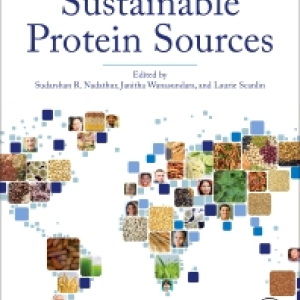
This books provides a first reference on dietary proteins that covers the land, water, and energy usage inputs, nutritive outputs, and food applications of plant and other non-meat proteins.
The book looks at how alternative proteins—such as plant, fungal, algal, and insect protein—can take the place of more costly and less efficient animal-based sources.
Abstract
(Elsevier’s overview) A plant-based food system intended for direct human consumption reduces the amount of required natural resources such as land, energy and water, with lower greenhouse gas emissions and a reduced carbon footprint. Availability of adequate amounts and types of pulses, cereals and grains will enable food manufacturers to produce more complete plant-based menu options. Consumer awareness of the relationship between food and health and environmental issues has spurred an increase in the consumption of plant-based foods. However, the adequacy of protein-rich crops and their ingredient supply chain is imperative for food manufacturers to offer new and sustainable products that resonate with consumers. Therefore, an alteration of our existing agricultural landscape and practices is necessary with a concurrent consumer demand towards more sustainable products.
This transformation of our farms and food supplies are not without its challenges. Subsidies, or crop protection policies for certain commodity crops, may hinder farmers from cultivating crops for direct human consumption. Erratic weather patterns may also affect crop health and yields of food pulses, cereals and grains. Not all consumers may gravitate towards plant-based or alternative foods. However, in order to provide food for 10 billion people by 2050, fundamental changes in our eating habits towards a more plant-based diet are essential. Consumer’s demand for sustainable food products and future dietary choices can directly influence the next generation of foods produced and the crops that will be cultivated.
Citation
Nadathur, S., Wanasundara, J. P. D., Scanlin, L., (2016) Sustainable Protein Sources, Academic Press, Print Book ISBN 9780128027783
You can read more about the book here.
Do also take a look at Forum for the Future’s Protein Challenge 2040 project, a global coalition of actors exploring how we feed nine billion people enough protein in a way which is affordable, healthy and good for the environment.
Read more in FCRN’s Research Library category Meat, eggs and alternatives, consumption and diets and they keyword categories on protein, consumption and production trends, consumer perceptions and preferences, insects and sustainable healthy diets







Post a new comment »